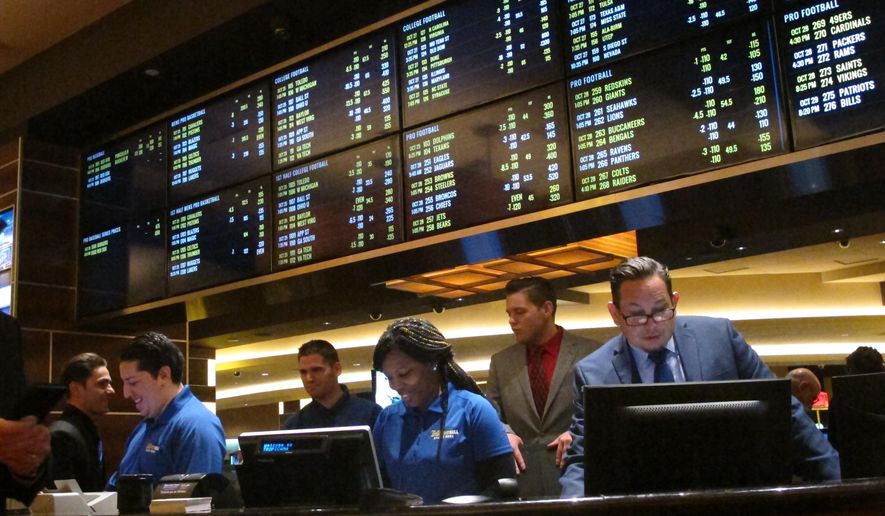Washington, D.C., it’s almost time to place your bets.
The District is on track to become the eighth and latest jurisdiction to legalize sports betting this year, just months after a Supreme Court decision made it legal nationwide.
The D.C. Council voted 11-2 in favor of the “Sports Wagering Lottery Amendment Act of 2018” Tuesday, the second of two votes required to pass in the council. Mayor Muriel Bowser is expected to sign the bill and Congress is not likely to intervene, leading to implementation beginning in 2019.
The bill creates two classes of sports gambling licenses, one for bars and restaurants and another for the four active, major sports venues in the District: Nationals Park, Capital One Arena, Audi Field and the Entertainment and Sports Arena in Ward 8. RFK Stadium was excluded from the list because it has no professional tenants and there are prohibitions against gambling on federal land.
Revenue that the District sees from sports betting will be dedicated to funding the city’s “Birth to Three” early childhood development program and the Neighborhood Safety and Engagement Fund.
The DC Lottery will regulate sports gambling and will get a monopoly on launching a smartphone app for betting in city limits. Stadiums will have the option to create their own apps to allow mobile wagering, too, but they will only work when users are inside the facility. Those will be the conditions the District starts out with, but they are subject to change, said Council member Jack Evans, the bill’s main sponsor.
“The bill includes a lot of flexibility,” said Evans, a Ward 2 Democrat. “There will be a Lottery app. If we decide somewhere down the road that we want to have multiple apps, we can do that as well. And it sets up a number of licenses and really gives an opportunity for many people in the District to participate.”
Wizards and Capitals owner Ted Leonsis, who has said legalized gambling would “save the NFL,” was critical of the council’s decision to limit initial competition for the DC Lottery.
“We are disappointed that this bill creates a monopoly run by the DC Lottery rather than a competitive marketplace for mobile betting. This is a disservice to fans, who don’t get the benefit of competition in the marketplace, and a disservice to the city, which will lose out on potential investment and job growth. We strongly encourage the Council to reconsider creating a robust, competitive marketplace for mobile betting in D.C.” he wrote in a statement.
The original bill was introduced in September, and since then, the council heard testimony from groups ranging from the American Gaming Association (AGA) to DraftKings, the “daily fantasy sports” giant.
DraftKings and Gambling.com Group are critical of the council’s single-operator, Lottery-run plan. DraftKings would have a lot to gain from being allowed to operate in the District as part of a free market approach.
Chris Cylke, the AGA’s vice president of government relations, is based in Washington and usually focuses on Congress. But he has followed and supported the council’s effort to legalize sports betting locally.
“D.C. has been interesting to see because obviously there’s been a lot of interest here,” Cylke said. “Councilman Evans I think wanted to be a first mover, so they were moving very quickly here.”
Cylke believes the District’s approach to its apps may be “somewhat confusing” to users.
“If you have Caps season tickets and you’re on your way to the arena, where you can use a mobile betting app to bet inside the arena or you can bet in the brick and mortar, but you can only use the Lottery app while you’re in your Uber on the way there, it just seems like they’re sort of unnecessarily frustrating the customer experience,” Cylke said.
In May, New Jersey won a Supreme Court case against the federal government that challenged the 1992 law limiting sports betting outside Nevada, on the grounds that it violated states’ rights. Seven states, including nearby West Virginia and Delaware, have legalized it since then, and Maryland’s and Virginia’s legislative bodies plan to debate similar measures next spring.
Evans and others who have worked with him on the bill approached betting legalization with a sense of urgency, feeling that Maryland and Virginia could draw District residents away next year. Evans has said he thinks legal sports betting will launch by the start of the 2019 Major League Baseball season. The only votes against the bill came from David Grosso, at-large independent, and Brianne Nadeau, Ward 1 Democrat. Nadeau’s opposition partly stems from seeing family members become addicted to online gambling. Grosso brought up the same drawback.
“The fact is that individuals in low-income neighborhoods are twice as likely to experience gambling addiction than in other neighborhoods,” Grosso said. “The lure of easy, though incredibly improbable, financial advancement preys upon low-income individuals” and can induce compulsive gambling.
Once Bowser signs the bill, Congress will have 30 days to choose to veto the bill if it wishes. Cylke does not think that will happen.
“It’s been very rare that they vote to overturn proactively anything D.C. government has done. There may be some scrutiny on just the fact that now we have sports betting in Congress’s backyard, so we’ll clearly be monitoring that to see if there’s any additional scrutiny in the sports betting area.”
Council member Kenyan McDuffie, Ward 5 Democrat, introduced an amendment to establish greater opportunities for certified business enterprises in the District owned by women or minorities. The amendment passed.
• Adam Zielonka can be reached at azielonka@washingtontimes.com.




Please read our comment policy before commenting.